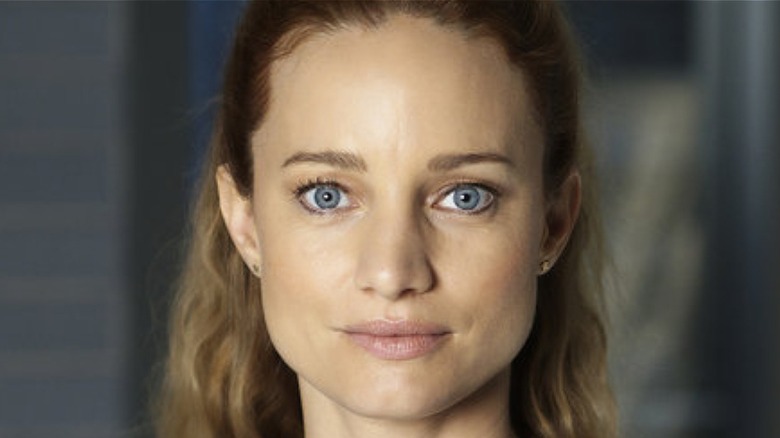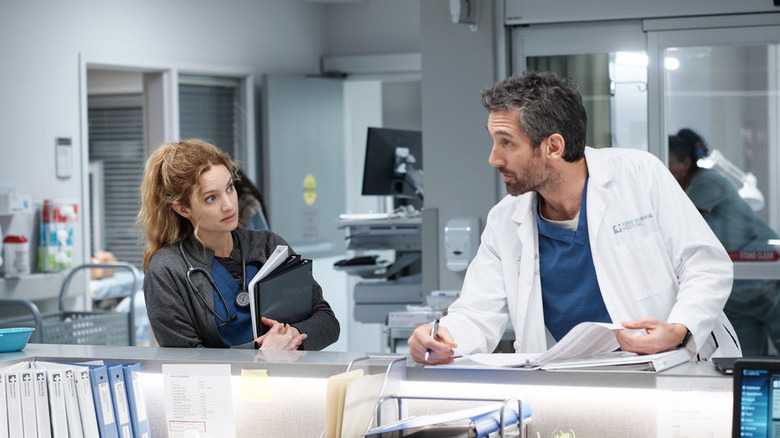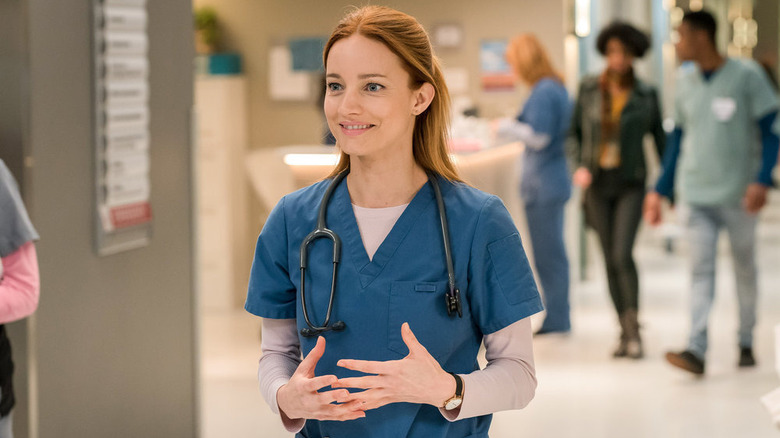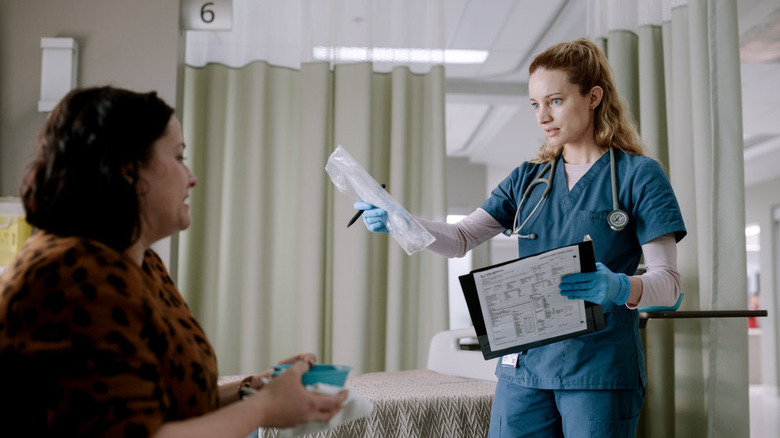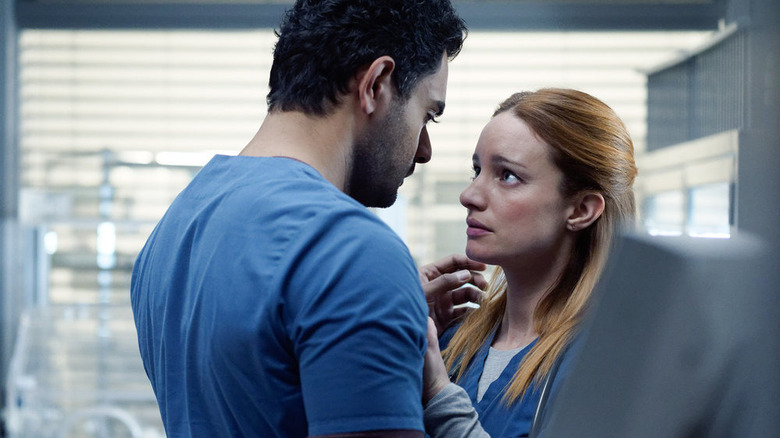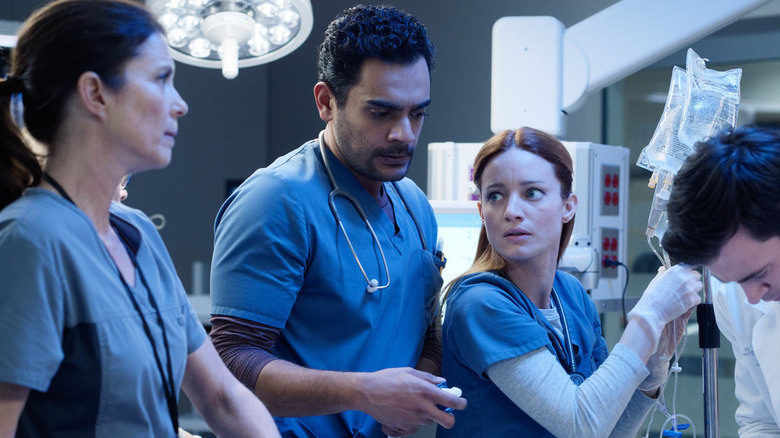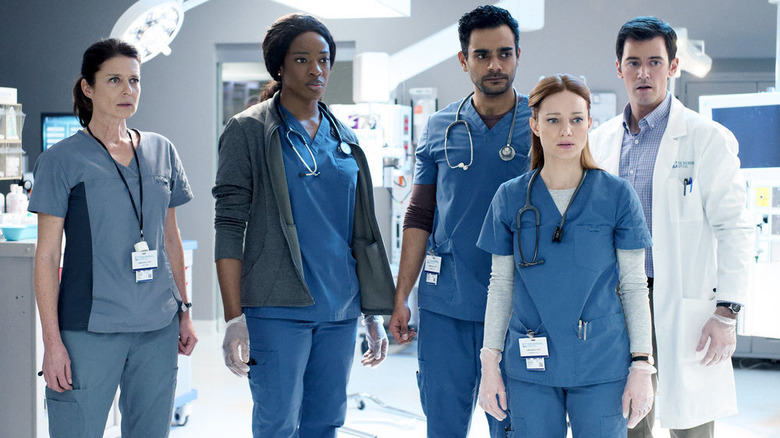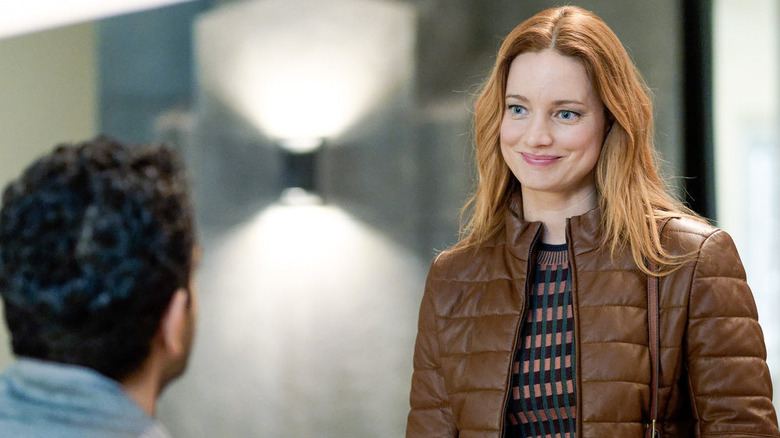Laurence Leboeuf Talks Becoming A Doctor In Transplant - Exclusive Interview
While we watch the tension grow on "Transplant," it can be difficult to remember that these TV doctors aren't actually real-life doctors. The cast of the Canadian series has gone through many medical boot camps in order to be able to understand the types of diseases they depict on screen — as well as how to pronounce them. Now, they make it sound easy explaining things like ehlers danlos syndrome and subdural hematoma.
All of this preparation in order to play a role certainly wasn't easy at first. Luckily, this medical terminology has become a lot more familiar over the course of two seasons for actress Laurence Leboeuf, who plays Dr. Magalie "Mags" LeBlanc. Now that "Transplant" has been renewed for a third season that's already in full swing, she's sure to walk away with even more medical jargon than ever before. We can't wait to see it unfold each week now that the Canadian series airs on NBC, so of course we had to ask her all about it.
In an exclusive interview with The List, Leboeuf told us how she prepared herself to depict Dr. LeBlanc, revealed whether or not she thinks Mags and Bash should end up together, and teased what we'll eventually be able to see in Season 3.
Why Laurence Leboeuf loves playing Mags
You've gotten to know Mags throughout two seasons of "Transplant" now. What do you love the most about playing her?
Since the beginning, and I've been saying this in [other] interviews, too, but I really wanted Mags to be the Hermione Granger of the ER. [One of] my favorite parts to play is her wittiness. She's first of her class. She's the first to raise her hands. She knows all the answers. She's so booksmart. She's so talented as a doctor, and I love playing her. I love playing that confidence in her and that brain that just never stops and knows it all.
I really love that, in our action scenes, I really wanted her to talk super fast and to get all this medical jargon out really quick whenever I could, so that's been my favorite challenge with Mags.
Here's how she prepared to play the TV doctor
For the medical aspects, you've gone to bootcamp. Can you talk about that a little bit?
Yeah, that's been great, because every time we have a really big medical scene to do, we get to go on boot camps on the weekends, so we have about a four-hour slot where we get to have really big rehearsals with the cast and the directors and with medical experts — with doctors and nurses and stuff that are there to answer all our questions and to organize that ballet, because it's a really big choreography of who's going where, and what are we doing? What are we manipulating? What words are we putting on top of those manipulations? It's like a space for us to better understand what we're doing. When we get on set, it's like, "Boom! We know the dance."
Do you feel like you've learned anything medical related that you've been able to apply to your own life?
Not really, sadly. [Laughs] It feels like it's such big medical jargon, you know? It's not just sutures and stuff. I could maybe do sutures. Maybe I'd be able to do those knots and stuff ... but the rest of it is such big medical procedures that I learn them, and I'm doing them, but then I forget half the jargon, and I forget how to do it.
I could do CPR, probably. On the bigger scale, no. It's too much. It's such a big — it's really enhanced my admiration for doctors. It's such a vocation of — Being a doctor, it's years of studying and also, yeah, such an immense dedication that's really admirable.
Do you feel like you've gotten more familiar with the jargon?
More familiar for sure, because then we could see it. From Season 1 to Season 2, there's vocabulary that comes back, so we have references on some stuff that we get to — when we call for labs or stuff like that, there's stuff that we're understanding a bit better, but not on the bigger scale. [Laughs] We have a bit more reference, for sure.
Are there any scenes that make the actress queasy?
A lot of the medical procedures that you do on the show can be a bit graphic. I'm not going to lie, I've had to look away a few times.
So have I.
Has anything ever made you really queasy on set?
Well, it's so funny, because I get really queasy when I watch stuff like that. Even on the show, the first season, the opening and the eye stuff and whatever, there's some stuff I can't watch. When we're on set for some reasons, maybe because I'm getting to understand more of the mechanic, and I know where the blood's coming from, and I'm cutting into silicone, there's a different thing where I feel more confident, and I don't get queasy, you know? But yeah. I mean, in general, I'm not a fan of needles, even fake ones.
They make it look so real on the show.
For sure. Our special effects team is incredible. It's incredible what they do with a mannequin and what they can do even with a real person, all the mechanics for it.
Laurence Leboeuf talks chemistry between Mags and Bash
Throughout Season 1, there have been some moments between Mags and Bash. Spoilers aside, do you hope that they end up together?
Secretly, I do. Mags was very awestruck by this man coming into the hospital with such a different way of doing things, but with such passion and spontaneity that it really challenged her. She is so used to doing it by the rules and by the book, and then this guy comes with all his talent and saves everybody, and he's doing it so differently. She really admired him for that.
It's been an ongoing and growing thing for Mags towards him, even though it's also — That's something about her where she's even socially a little bit awkward, you know? The hospital has been her life, so I think she's a bit clumsy in that area. Deep down, I know she likes him. [Laughs]
What's it been like working so closely with Hamza Haq?
It's been amazing. I didn't know him before we started working and only heard about him through some friends, but he's been an amazing partner to work with. He's such a talented actor, and he's so dedicated, and he's so passionate about the work. It's really easy to fall into it with him and to share our passion for it. We find little details here and there all the time, and we talk about it a lot, and I love that. It's a great camaraderie on set with everybody. It's been amazing.
What filming a medical drama during a pandemic was like
For Season 2, you had to film during a worldwide pandemic. How did that impact your experience on a medical drama?
Yeah, that was tough at the beginning because, although we were extremely happy to go back on set because we'd been pushed since — we were supposed to start in July, and we ended up filming in February, so we were really, really happy to be there.
It's true that maybe the pandemic — I'm going to speak for myself, but I felt a bit more fragile going back on set. I think it's because of having been at home for so long, not having been in contact with a lot of people, and it was — then we go back with the masks and the glasses, and then there was this 15-minute rule that we had here. I don't know if it was that in the States, but we weren't allowed to be more than 15 minutes per day within a meter of someone else, per actor, so that's a crazy puzzle to do with every actor, especially on a medical show. That was a bit of a challenge.
Being in our own bubble with the masks and everything, it took us a little bit to get the machine going again, and to get used to that and then to feel finally comfortable after a few months that [we could say], "Okay. This is the way that we're going to do it."
It's such a fun part of working is to be with the people that you work with, and then you had to be isolated. We had to eat in our trailers. We couldn't really be together, so that took away a bit of that. I still think the show turned out really great, and I don't think we can tell that much of all these restrictions we had and everything, so we did pretty good.
Here's what we'll get to see in Season 3
What kind of reaction have you been getting so far for Season 2 from your American audience? We are a few episodes behind Canada.
Because it's so fresh now in the States, the reaction was, we had a lot of people really expecting it. We had a lot of, "When is it coming? When is it going to premiere? When is it starting?" We had a lot of that buildup and excitement, and people are really happy to finally be able to discover the second season.
I'm not someone who's really big on social media, so I don't have that close contact with fans, or with people that watch the show, but this is from the echoes that I'm getting.
"Transplant" is already renewed for Season 3. Do you know anything yet about what the next chapter holds for Mags?
We start shooting just now in March, so we've already read three episodes, and I can't really say that much, because I don't want to spoil the end of the second season, but we're going to pick it up a couple months after the finale of the second season. Things are going to change a lot for the team, and there's going to be a lot of people who will need to adapt to a different dynamic and stuff, so "to be continued."
Laurence Leboeuf talks show business and writing her own books
Both of your parents, I didn't realize, are actors. What kind of advice did they give you when you entered show business?
It's so funny, because I was always someone who really did my own thing. I started acting when I was, like, 10 years old, and I've been very independent on that front. Maybe it was my way to detach myself from my parents, in that sense. I've always really trusted my instincts about projects that I was doing.
What I'm getting from them is the way that they would treat people, the way that they would behave themselves on sets and the theater and how people loved to work with them and loved their company. They were very respectful, always respectful to everybody on set and stuff. That was something that I remember my mom telling me, how important that was to have that kind of respect and that kind of regard for everybody, whatever their job that they were doing. That's something, without them telling me exactly that, I think that's the advice I got.
I love that. Good life advice, too. I know that you have hopes of producing and writing your own content in the future. What kind of stories do you want to tell?
Oh, my God. That's such a future plan that I — Yeah, I would love to get there. I love to read books a lot, so a novel was always something that I would dream of writing. I have no idea what kind. I don't really know the direction I would want it to take. I think it'll come to me at some point.
If I'm talking about wanting to maybe write a series or something, I love drama, so I would definitely go towards something really moody and very artsy — I like the dark. I like the raw. I like the real stuff of life, so I would aim for that.
New episodes of "Transplant" air Sunday nights at 10 p.m. ET/9.00 p.m. CT on NBC.
